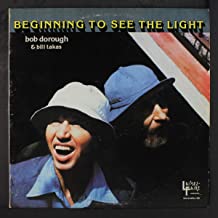
Daily Dose Of Jazz…
William “Bill” Takas was born March 5, 1932 in Toledo, Ohio and played in the band that backed Bob Dorough from the mid-1950s. His first recordings with the singer were made in New York City in 1956, Devil May Care for Bethlehem Records.
In the following years Bill also worked with Frank Socolow Sextet, Nat Pierce, Tal Farlow, Dan Terry and Pee Wee Russell. In the 1960s he played with the Gerry Mulligan Concert Jazz Band and the bands of Cy Coleman, Don Elliott, Benny Goodman, Doc Severinsen and Les DeMerle. In 1962 he made a guest appearance with Ruby Braff at the Newport Jazz Festival.
From the 1970s to the late 1990s Takas continued to work in a duo with Bob Dorough, recording Beginning to See the Light in 1976, in a trio, heard on Devil May Care II with Al Levitt, and Right On My Way Home in 1979 with Grady Tate, with guest soloists such as Art Farmer and Phil Woods.
Bill was in the all-star formation Children of All Ages with Randy Brecker, Lew Tabackin, Arnie Lawrence, Pat Rebillot, Ron McClure, Buzzy Linhart, among others and Bill Goodwin. Together with Dorough, he released a Charlie Parker tribute album PHililogy in 1995.
Between 1956 and 1997, double and electric bassist Bill Takas was involved in 37 recording sessions in the field of jazz.
More Posts: bandleader,bass,history,intrumental,jazz,music
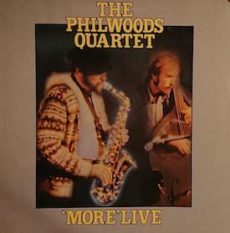
Requisites
‘More’ Live ~ The Phil Woods Quartet | By Eddie Carter
Alto saxophonist Phil Woods was one of the unsung heroes of jazz, he was equally adept at Cool Jazz, and Hard-Bop with a gorgeous tone, and speed of execution that never failed to please his fans. ‘More’ Live (Adelphi Records Inc. AD 5010) is the second live session that The Phil Woods Quartet performed at The Armadillo World Headquarters in Austin, Texas during 1978 and 1979. It hit the stores in 1981, following their 1980 album, The Phil Woods Quartet Live, Volume One, featuring Mike Melillo on acoustic piano, Steve Gilmore on acoustic bass, and Bill Goodwin on drums. My copy used in this report is the 1981 US Stereo album.
Side One opens with Miles Davis’ Milestones. Phil is excellent on the lead solo, backed only at first by Steve and Bill. Mike joins them, then takes over on the second interpretation. Steve’s bass dances brightly on the third reading and Bill has the last word in an exchange with Phil and Mike before the reprise and close. Eiderdown by Steve Swallow kicks off with a five-minute performance by Gilmore who solos impressively. Woods launches into the next statement with inspired exuberance and Melillo takes care of business on the closing chorus.
Horace Silver’s Strollin’ begins Side Two in a relaxed vein for the ensemble’s theme. Mike kicks off the solos with a vivaciously spirited interpretation. Phil moves into the spotlight next with a soulful tone and agility that builds to a compelling conclusion. Steve shines on the closing statement with a quiet intensity ahead of the foursome taking the song out. Mike Melillo’s See Hunt and Liddy begins with a lovely introduction by the pianist developing into the quartet’s sprightly mood on the melody. Melillo lays down a solid groove on the opening statement that delivers the goods. Gilmore’s bass takes a brisk trip through the next reading, and Woods turns up the heat with a vigorous, energetic closing chorus culminating with the group’s climax. The engineers for See Hunt and Liddy are Jim Finney, Mark LeBaron, and Hank Allrich. The men behind the dials of the remaining tracks are Cliff Carter, Fletcher Clark, and LeBaron. The ensemble is tight, the music is terrific, the album has an exceptionally good soundstage, and I’m very impressed with the sound quality.
In addition to playing the alto sax, Phil Woods was also proficient on the clarinet. Woods was married to Chan Parker for seventeen years, and Stepdad to her daughter, Kim. His discography is extensive with sixty records as a leader and many others as a sideman performing with some elite jazz musicians and pop vocalists. His final live performance was a tribute to Charlie Parker with Strings on September 4, 2015. He passed away from emphysema twenty-five days later on September 29 at the age of eighty-three. Now that I’ve found this one, I’ll certainly be on the lookout for its companion album. If you’re in the mood for some Post-Bop and are a fan of any LP’s by Phil Woods, I offer for your consideration, ‘More’ Live by The Phil Woods Quartet. An album of sumptuous jazz that’s sure to satisfy almost any jazz appetite!
~ The Phil Woods Quartet Live, Volume One (Clean Cuts CC 702) – Source: Discogs.com
~ Milestones – Source: JazzStandards.com
© 2020 by Edward Thomas Carter
More Posts: choice,classic,collectible,collector,history,instrumental,jazz,music,saxophone
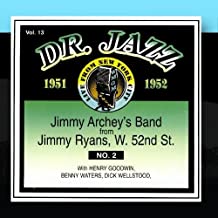
Daily Dose Of Jazz…
Jimmy Archey was born on October 12, 1902 in Norfolk, Virginia. He began playing when he was twelve and was getting professional gigs a year later. He studied at Hampton Institute from 1915 to 1919, played in Atlantic City, New Jersey for a while before moving to New York City in 1923.
During the Roaring Twenties, he played with Edgar Hayes, Most noteworthy for his work was in several prominent jazz orchestras and big bands of his time, including leading one of his own. He performed and recorded with the James P. Johnson Orchestra, King Oliver, Fats Waller, and the Luis Russell Orchestra, among others.
The late 1930s saw Archey participating in big bands that simultaneously featured musicians such as Benny Carter, Coleman Hawkins, Cab Calloway, Duke Ellington, and Claude Hopkins. In the 1940s he toured France with Mezz Mezzrow and in the 1950s, he spent much of his time working with New Orleans revivalist bands with artists such as Bob Wilber and Earl Hines.
Becoming a bandleader, during the next few years, he headed a sextet, which in 1952 had trumpeter Henry Goodwin, Benny Waters on clarinet and pianist Dick Wellstood. A major yet underrated musician, his only sessions recorded as a leader were for Nec Plus Ultra, the French Barclay and the 77 label. Trombonist Jimmy Archey passed away on November 16, 1967 in Amityville, New York.
More Posts: bandleader,history,instrumental,jazz,music,trombone
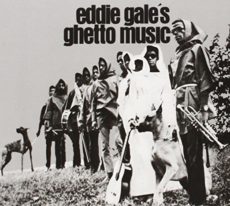
Requisites
Ghetto Music is the 1968 debut album recorded by trumpeter Eddie Gale and released on the Blue Note label. The album seamlessly blends the new jazz of the ’60s with gospel, soul, and the blues. It was very much representative of the upheaval and turbulence in America at that time, being recorded just five months after the assassination of Martin Luther King Jr.
The Allmusic Guide awarded the album 5 stars and stated “The aesthetic and cultural merits of Eddie Gale’s Ghetto Music cannot be overstated. This is some of the most spiritually engaged, forward-thinking, and finely wrought music of 1968”.
Recorded at Rudy Van Gelder Studio, Englewood Cliffs, New Jersey on September 20, 1968. All five compositions are Gale originals: The Rain, Fulton Street, A Understanding, A Walk With Thee and The Coming of Gwilu.
The Band: Eddie Gale – trumpet, thumb piano, steel drum, bird whistle, Russell Lyle – tenor saxophone, flute, Jo Ann Gale Stevens – guitar, vocals, James “Tokio” Reid, Judah Samuel – bass, Richard Hackett, Thomas Holman – drums, Elaine Beener – lead vocals, Sylvia Bibbs, Barbara Dove, Evelyn Goodwin, Art Jenkins, Fulumi Prince, Edward Walrond, Sondra Walston, Mildred Weston, and Norman Wright – vocals.
More Posts: collectible,trumpet
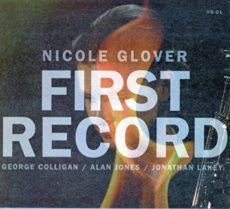
Daily Dose Of Jazz…
Nicole Glover was born on July 18, 1991 in Portland, Oregon. Her journey in music began when her father introduced her to improvised music at a young age. She began playing the clarinet at the age of ten, transitioning to tenor saxophone the following year. Blossoming in high school, she was one of 19 students from across the nation to be selected for the Next Generation Jazz Orchestra national tour. The performances had her playing with Bobby Watson, Julian Lage and with Wynton Marsalis at the Monterey Jazz Festival.
After studying at William Paterson University, Nicole returned to Portland in 2011 and was invited to record on Esperanza Spaulding’s Grammy winning album Radio Music Society. She has since performed and recorded with George Colligan, Alan Jones Storyline Sextet, Thomas Barber’s Spiral Road and the Kerry Politzer Quintet, as well as her own jazz trio. Not limiting herself to jazz, her work as a member of Ural Thomas and Pain, won them Willamette Weekly’s Best New Band of 2013 and received an Emmy Award for their feature episode of Oregon Art Beat, and they have opened for Parliament Funkadelic and Booker T. Jones.
In 2015, Nicole released her debut album First Record featuring George Colligan on piano and trumpet, bassist Jonathan Lakey and Alan Jones on drums. A move to New York City in 2017 has seen her recording and touring with Gene Perla, Steve Wilson, Rodney Green, Winard Harper, Jeff “Tain” Watts, Bill Goodwin, Mulgrew Miller, Kenny Garrett, Geoffrey Keezer, Bennie Maupin, Bobby Watson, Mike Clark, Bill Stewart, Mel Brown, Rob Scheps, Terell Stafford, Helen Sung, Boris Kozlov, Dana Hall, and Scotty Barnhart. Tenor saxophonist Nicole Glover continues to perform and record across musical genres and expand her career.
Sponsored By

![]()
#preserving genius
More Posts: saxophone



